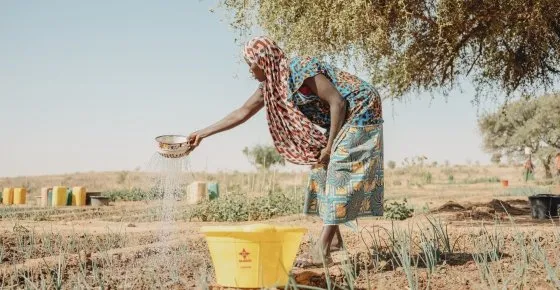Each year, World Food Day is observed on 16 October and marks the United Nations Food and Agriculture Organisation’s (FAO) founding in 1945.
It is an opportunity to spark conversations about our food, how it is produced and all its dimensions: availability, accessibility, utilisation and stability.
This year World Food Day is being marked in the broader context of a climate crisis – which is causing extreme weather events such as prolonged droughts and devastating floods. These wreak havoc on our ecosystems and food security.
Freshwater resources per person have declined by 20 percent in the past few decades, and water availability and quality are deteriorating fast due to decades of poor management and increased pollution from human activities.
Only 2.5 percent of all water is fresh, meaning it is suitable for drinking and agriculture. Agriculture is the largest user of the world’s freshwater resources – accounting for more than 70 percent of total water withdrawal.
In Ghana, a nation blessed with abundant natural resources, the importance of water for food security cannot be overstated. Ensuring water security is fundamental to achieving the Sustainable Development Goals. Without water security, we have no food security.
It is for this reason that a Public Diplomacy Officer at the United States Embassy, Kevin Brosnahan, has cautioned that failure to address the prevailing challenge of illegal mining risks making the country a net importer of water, as well as the environment becoming unfit for agricultural use.
Mr. Brosnahan fears that without immediate steps to arrest the situation, it will be difficult for the country to sustain its agricultural needs and maintain a healthy environment.
The US Embassy Press Attaché spoke at the opening session of ‘Tech Camp Takoradi’, a three-day workshop aimed at finding solutions to illegal mining. Tech Camp Takoradi was organised by the U.S. Department of State, U.S. Embassy in Ghana and the University of Mining and Technology (UMaT), Tarkwa.
Illegal mining is one of the most challenging and serious threats to Ghana’s environment. Mr. Brosnahan also added that the embassy has sponsored capacity-building for law enforcement personnel to crack down on transnational criminal networks in the sector.
Rapid population growth, urbanisation, economic development and climate change are putting the planet’s water resources under increasing stress. Indeed, agriculture accounts for 72% of global freshwater withdrawals, but like all natural resources fresh water is not infinite.










